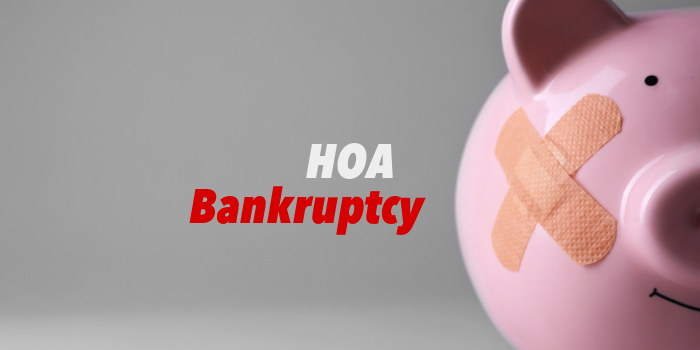An HOA is an organization that runs on money, similar to other businesses and agencies. And similar to those other organizations, when the HOAs money runs out, they, too, can go bankrupt. Declaring bankruptcy is rarely the answer for HOA communities, although it can, on occasion, happen. If your association has more debts than it has funds, consult with a specialized bankruptcy attorney as quickly as possible, as they will be able to guide you through the next steps and find the best solution for your community.
What are some of the reasons that an HOA would go bankrupt?
– Mismanagement of funds
– Lack of transfers made to the reserve account
– Large unplanned expenses that are not covered by insurance policies, due either to lack of coverage or insufficient coverage
– Internal fraud or embezzlement
– Multiple foreclosures in the neighborhood, resulting in a decreased flow of assessment funds
Poor money management by members of the board is the most common thing that causes an HOA to go bankrupt. Overspending, not leaving enough money in the reserves, and/or spending money before it has been collected can all result in the HOA not having the funds necessary to fulfill all liabilities.
Will I lose my home if my HOA goes bankrupt?
The most common type of legal filing for an HOA is Chapter 11, which allows for a reorganization of financial management. Bankruptcy courts are most in favor of reorganization because they allow the HOA to essentially solve their own problems, without the local government taking on the problems of the failing HOA. Essentially, Chapter 11 states that the HOA will continue to manage the daily proceedings of the community but any big decisions will need court approval. Under Chapter 11, the HOA will come up with a repayment plan, and will follow that plan under the supervision of a court trustee until all debts have been repaid. The less common type of filing is Chapter 7, which required a liquidation of assets to pay the debts.
It is important to note that a homeowners association is set up such that all homeowners are held accountable for a portion of the debts of the association. The HOA will do whatever necessary to get those funds, usually by levying special assessments, before they consider declaring bankruptcy. Individual homeowners are responsible for paying their share of the association’s financial obligations, and if they are unable to do so the association can take action to get those funds. Personal property can be sold in order to fulfill large debts, however, there are steps that can be taken before it gets to that point, so be sure to consult with an attorney that specializes in condominium and HOA community type cases.
Can homeowners sue board members for negligence if the HOA goes bankrupt?
Homeowners do have the right to sue the HOA for negligence of fiduciary duties. Neglecting their fiduciary duty means that the HOA has not exercised reasonable and good faith decisions while performing its duties, for example not properly managing the community’s finances. A homeowner has the right to sure the HOA as a whole, or an individual board member. Individual board members can breach their fiduciary duty by regularly not attending meetings, making poorly informed decision about important matters, or making decisions in their own self-interest or that result in individual gain.
Additionally, it is worth noting that HOA members can lobby for penalties or legislation that will result in criminal damages for intentional bad management of finances.
What actions can be taken to prevent HOA bankruptcy?
In order to prevent possible bankruptcy, the HOA board needs to be transparent, honest, and frugal in all of their decisions. A well-managed HOA does not need to worry about bankruptcy. Through strategic planning, proper budgeting, saving an ample amount of funds in reserve, and keeping open communication with residents about all financial decisions, HOAs should be able to function normally within the parameters of their revenue stream.








policies and procedures for HOA boards to transition to the newly elected board
i know a hoa that is about to go bankrupt, however it is still not turned over by the developer. in case they run out of funds, can the developer take over and fund the village expenses?